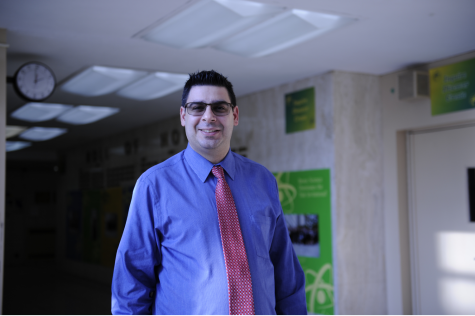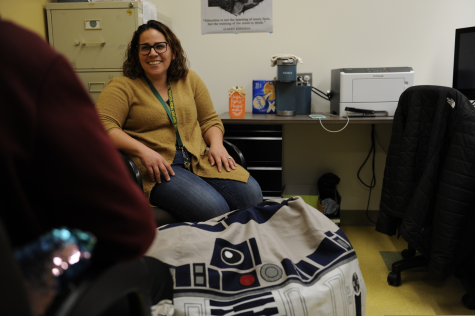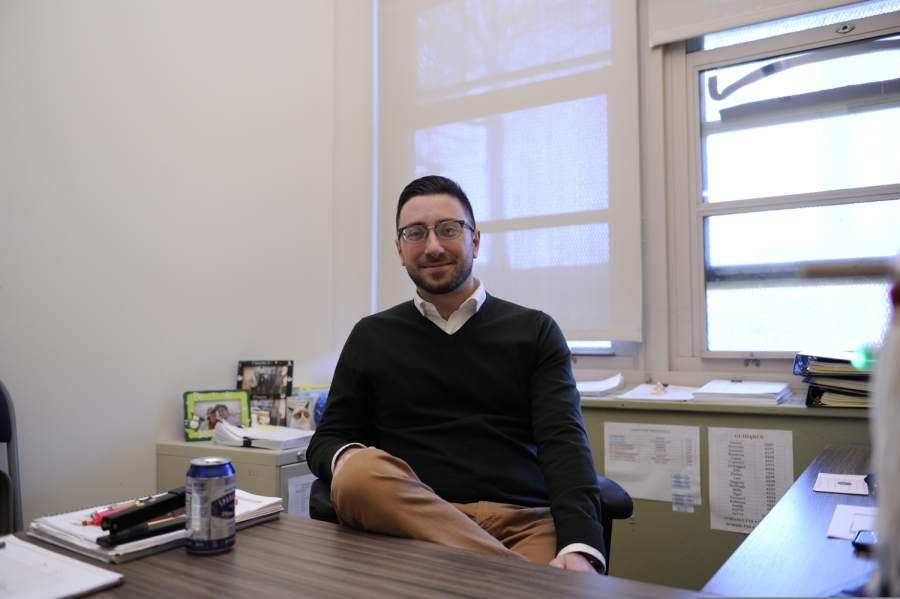The Reality of Managing Mental Wellness
Professional Advice on Aiding People Going Through Mental Health Issues
Guidance counselor Mr. Elia provides support for his students, as well as anyone else who needs it.
A challenge all of us face is maintaining our mental wellness. However, sometimes those around us are the ones who struggle the most. The reality is that many students have friends struggling with mental wellness. Some already seek professional help, but there are still many students that are putting themselves in dangerous situations with little to no information on how to cope. Thankfully, the Bronx Science Guidance Department is trained in responding to these scenarios. Even if your guidance counselor is unavailable, anyone else in the office will be more than welcome to help you. “Regardless of who’s available, we all operate on an open door policy. Whoever is free, just go to that person,” said guidance counselor Mr. Elia.
This list includes Ms. Heckman, the new school Social Worker. Ms. Heckman specializes in helping students with mental health and wellness issues. She encourages students who believe they have a certain friend who is ‘at risk’ to come and speak to her. According to all of the guidance counselors, many people will not ask a friend for help unless they believe that friend can offer some solutions. “Anyone who is experiencing some really difficult feelings wants to talk about it with someone whom they potentially feel might be helpful,” said Ms. Heckman. “Even if they’re expecting confidence, and that person still deems that coming to talk to someone is the thing to do — which always is the thing to do — by natural intuition, that friend probably expected this person to say something.”

As the Assistant Principal of the Guidance Department, Mr. Nasser helps in making sure that Bronx Science is a safe and welcoming community.
In many cases, friends may not open up about their feelings, but students can still help them. One sign of students struggling to deal with mental wellness is a change in mood. “It doesn’t have to be a drastic change. Usually it is a gradual change. You’ll start seeing them withdrawing from things they enjoyed. Of course, no individual things mean they will self harm, but these are little signs that when put together are indicative of something more,” said Mr. Elia.
Another key indicator is social media. “Subject matter that they’re posting can lead to a matter of concern. We’ve been able to help a lot of students as a result of things that have been posted on social media,” said Mr. Nasser, the Assistant Principal of the Guidance Department.
On of the things most useful about the Guidance Department is the legal mandate of confidentiality. This especially exists within Ms. Heckman’s office. Anything said in Ms. Heckman’s room will legally remain private with Ms. Heckman. However, there is an exception. “I will always inform a parent if there’s self harm involved, if someone is hurting them, or if someone is hurting someone else,” said Ms. Heckman.
“A lot of times, kids feel worried that their parents might look at them differently, that they might overburden their parents, or they’re worried that their parents would become upset. Their parents can be upset that they didn’t do something about it, or upset that this is happening and want to help. We can help filter the message in a way that they understand so that it is not a judgement on them or you,’’ said Mr. Elia. Although guidance counselors normally only work with Bronx Science students, they are able to extend their influence to students at all schools.
“We have called many schools and said, ‘This is what we’ve heard, can you check in?’ because there is identifying information. We don’t have to give a name, or even say what school we’re from,” said Mr. Nasser. The school can still provide aid to family members who are not affiliated with any school, or are legal adults. “For family, we can equip that student from Bronx Science with resources so that they can pass it along. If there is imminent danger and it can’t wait, call 911 to get that person the help they need,” Mr. Nasser said. Additionally, a family doctor or even a pediatrician familiar with the family can help the adult.
No matter the situation, mental wellness must be prioritized. Instead of letting fear and stigma rule our conscious, it is essential to sometimes make the hard decision to seek help for yourself and others.

As the school’s Social Worker, Ms. Heckman helps numerous students.
List of Resources in school:
Guidance counselors
Ms. Heckman, the Social Worker
Jewish Board
Mental Health Board
Talk about It Tuesday
Mental Health Clubs: BC2M or MHA
List of Hotlines:
Suicide Prevention Hotline: (800-273-8255)
Anxiety and Depression Association of America (ADADD): (240-485-1001)
Depression and Bipolar Support Alliance (DBSA): (800-826-3632)
National Center of Excellence for Eating Disorders (NCEED): (800-931-2237)
“Regardless of who’s available, we all operate on an open door policy. Whoever is free, just go to that person,” said guidance counselor Mr. Elia.
Logan Klinger is an Editor-in-Chief of ‘The Science Survey.' She loves journalism because it allows for the opportunity to study society through different...

